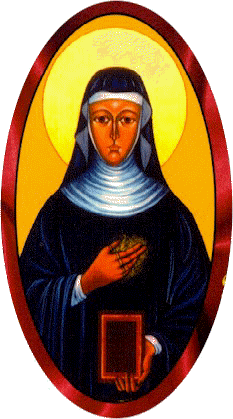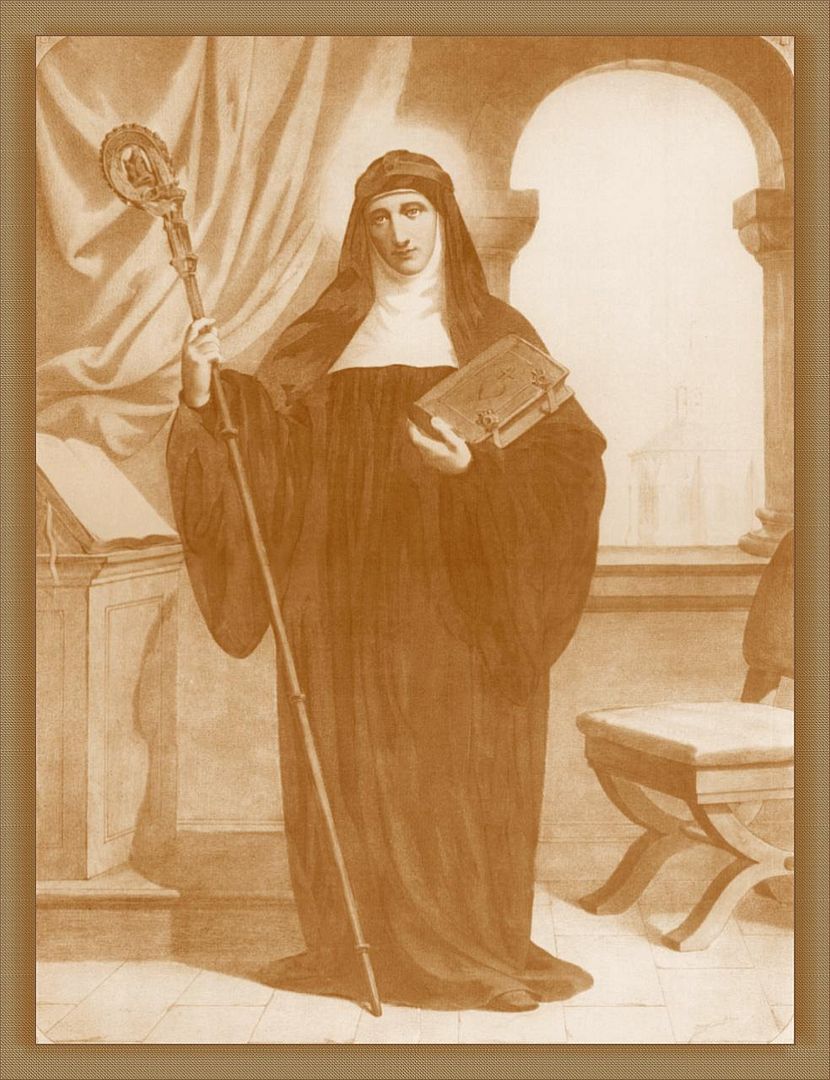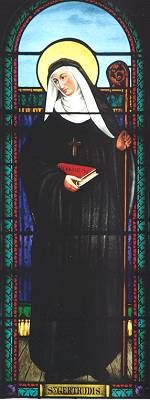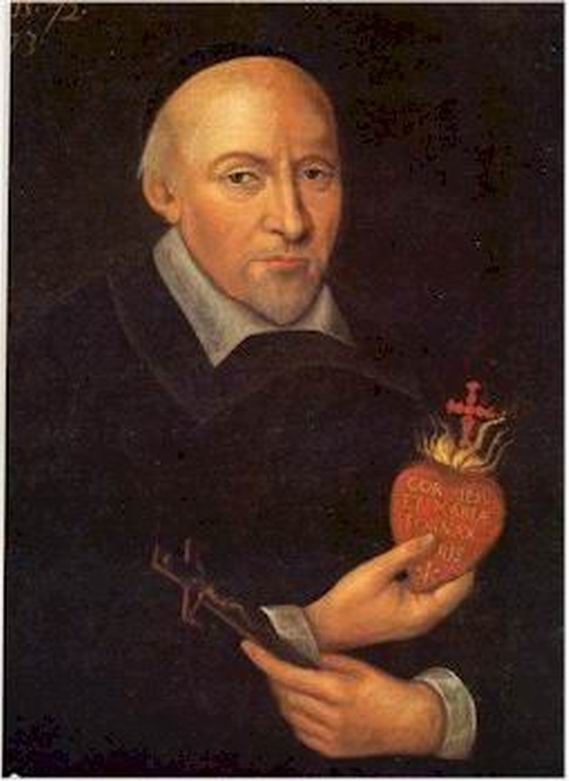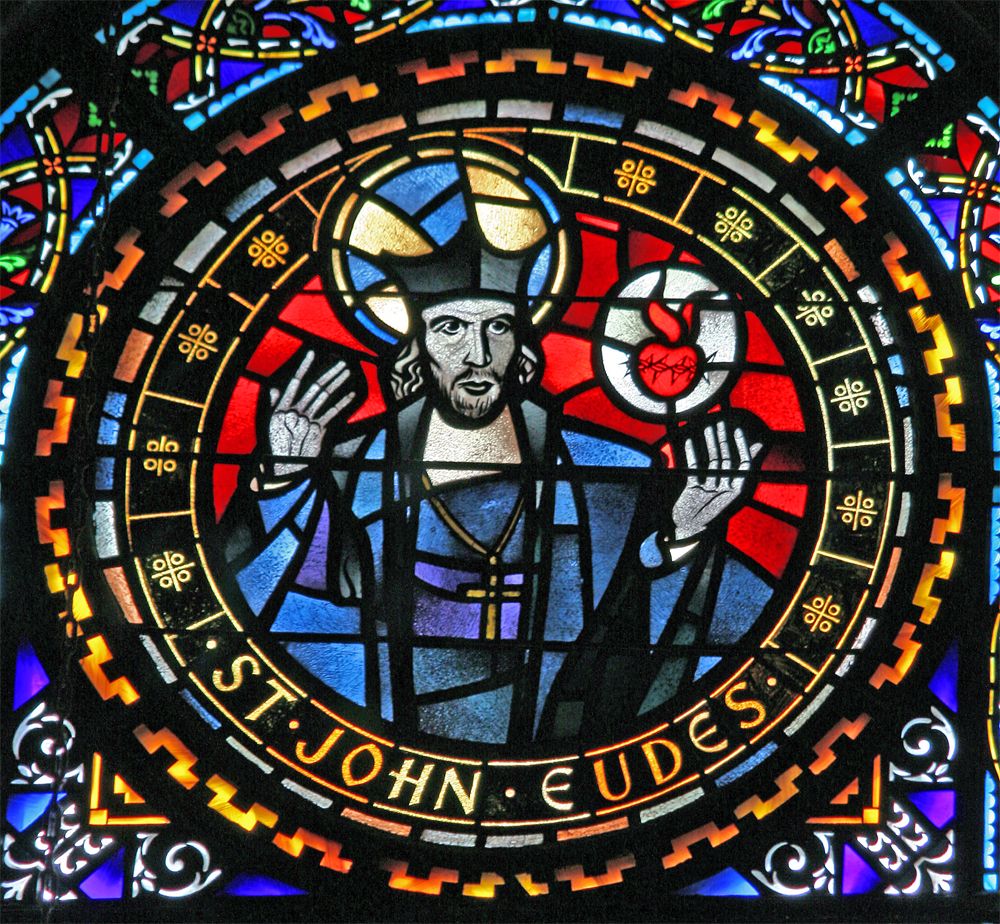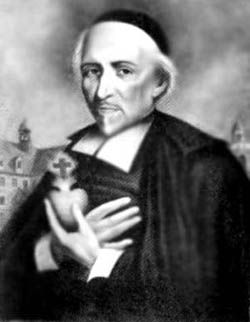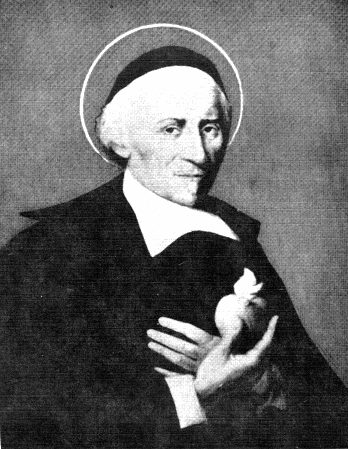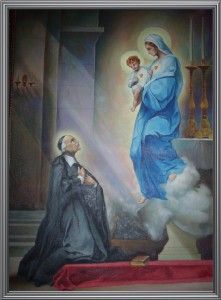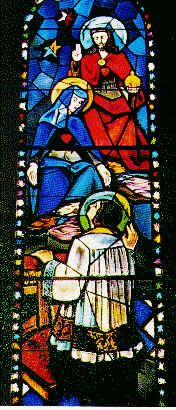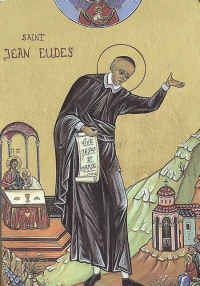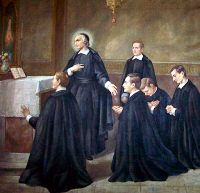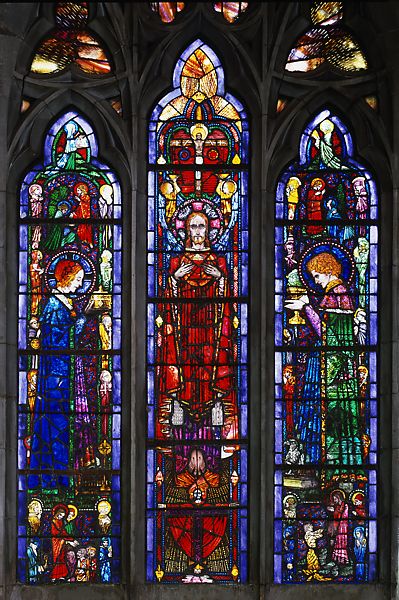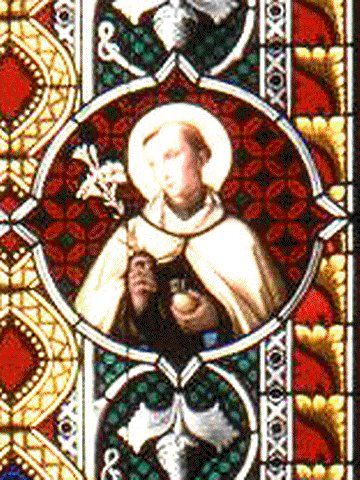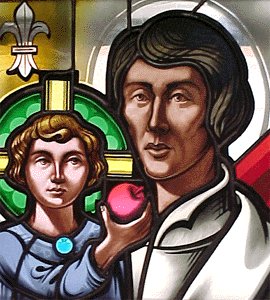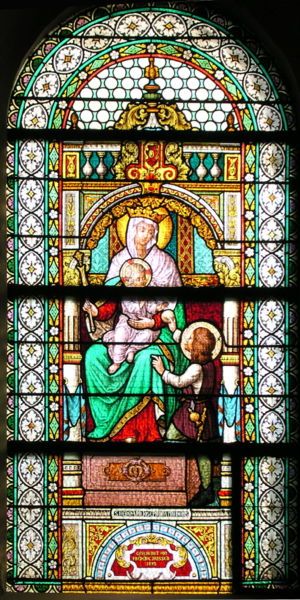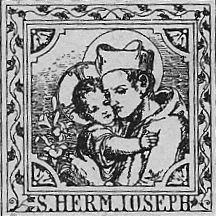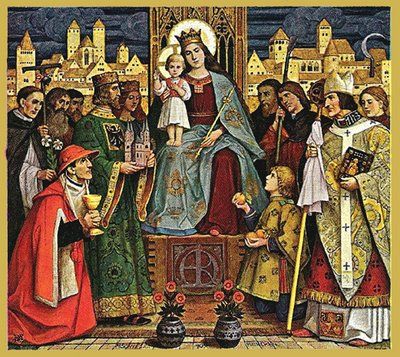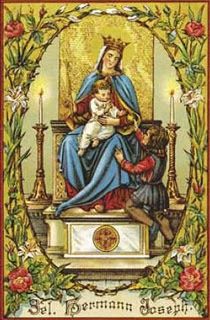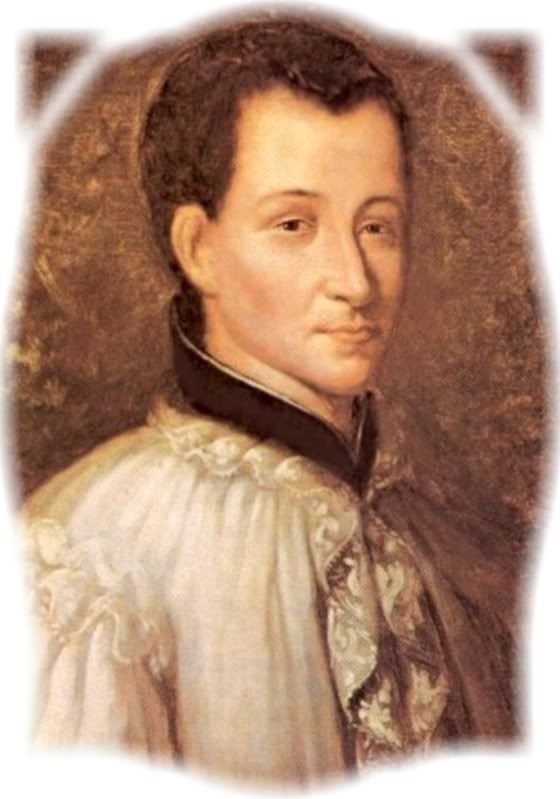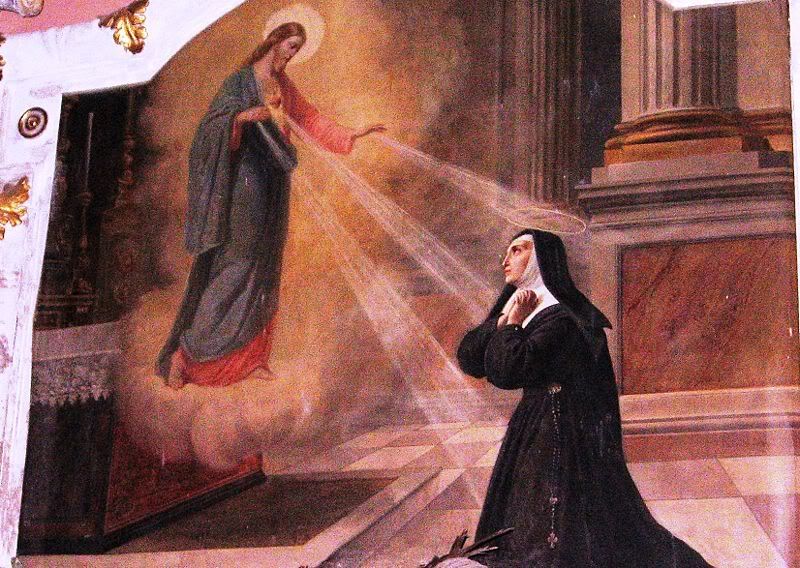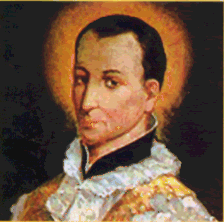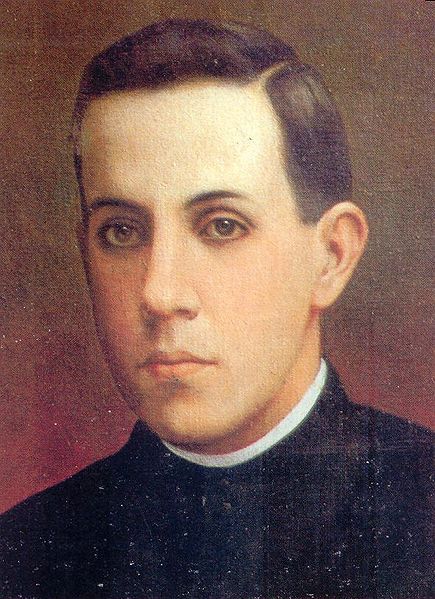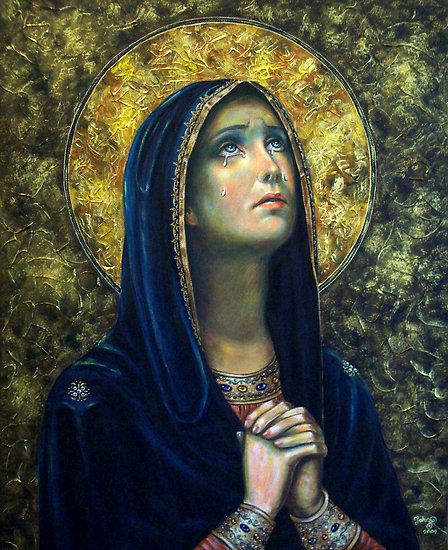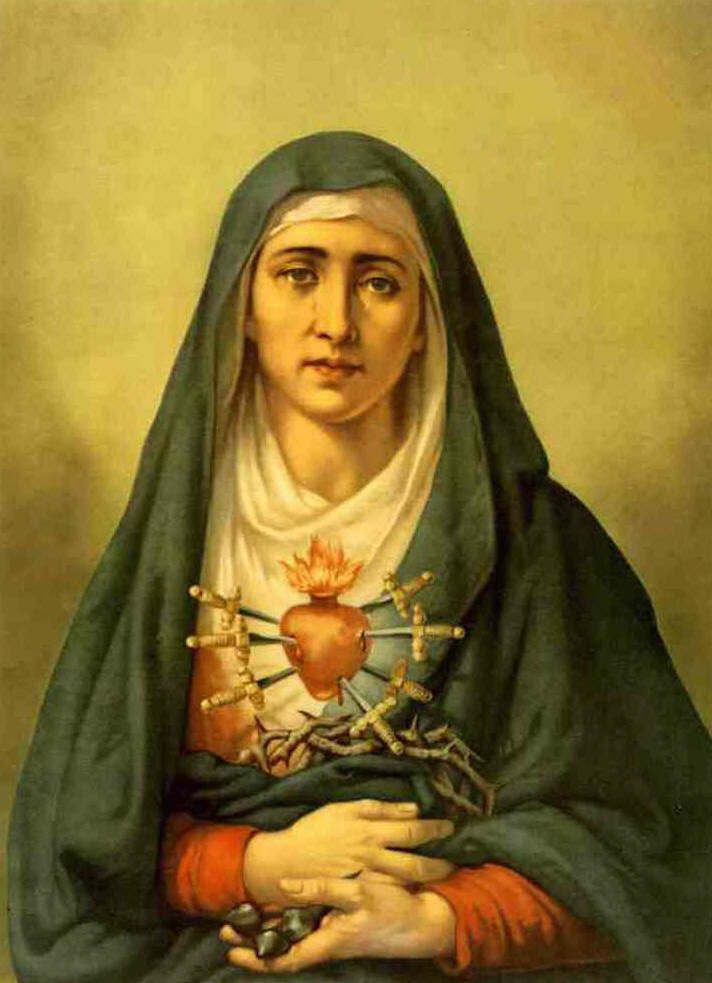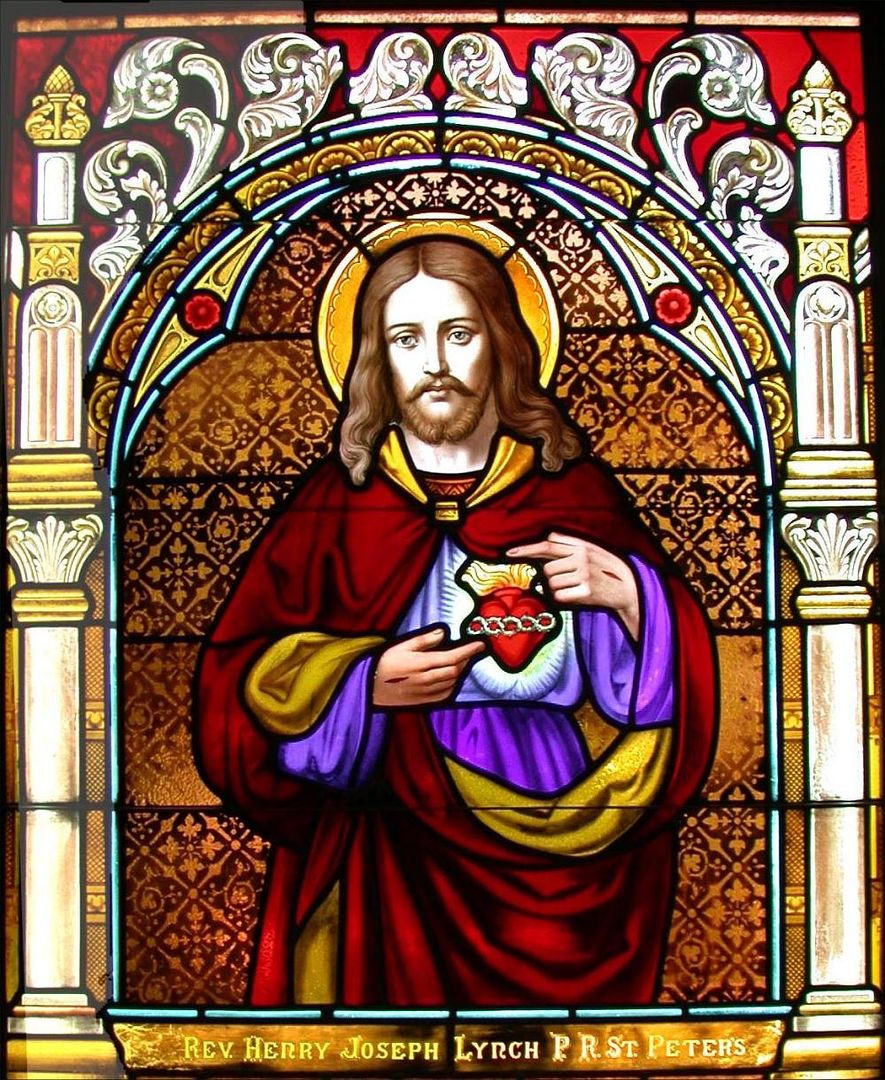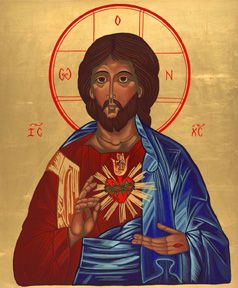"Lord, you have granted me your secret friendship by opening the sacred ark of your divinity, your deified heart, to me in so many ways as to be the source of all my happiness; sometimes imparting it freely, sometimes as a special mark of our mutual friendship. You have so often melted my soul with your loving caresses that, if I did not know the abyss of your overflowing condescensions, I should be amazed were I told that even your Blessed Mother had been chosen to receive such extraordinary marks of tenderness and affection"
Today, November 16, we also celebrate the feast day of Saint Gertrude the Great (also known as Gertrude of Helfta, 1256-1302), mystic, writer, visionary, Virgin of the Church, and Abbess. Saint Gertrude is referred to as "the Great" because of her single-hearted love for the Sacred Heart of Jesus, her numerous writings and exercises for the faithful, and her tireless compassion and prayer for the souls in purgatory.
Little is known about the early life of Gertrude, other than that she was born in Eisleben in Saxony. Her parents were either deceased or incapacitated, and by the age of five, Gertrude had been placed in the care of a cloister of Benedictine nuns in Rodalsdorf. When she completed her studies, she was moved to the monastery at Helfta (although it isn’t clear why). The sisters of the Helfta monastery kept records, describing the child, Gertrude, as loveable, quick-witted, and gracious. She progressed through her studies with ease, demonstrating clarity of thought and depth of understanding far beyond her years. While she excelled at all subjects—including grammar, rhetoric, logic, and Latin—Gertrude was most adept at theology and divinity studies. She also studied and excelled at music.
When she reached the age of admission, sometime around 16, Gertrude took the veil at Helfta monastery, entering the community there, and committing herself completely in service to the Lord. As a novice, she continued her studies in liturgy, scripture, and spiritual writing. A voracious reader, she became fluent in Latin and German. However, as much as she excelled at her studies, her sisters believed her to be neglecting her spiritual calling. And by her own admission, by the age of 24, Gertrude had grown tired of the monastic routine, and fallen into a deep depression.
However, that would soon change. Just after she reached her 25th year, Gertrude was confronted by a mystical encounter with Christ—an event she referred to as her “conversion.” In her experience, she heard Christ (deep within her heart) say: "Do not fear. I will save you and set you free." She wrote: "in a happy hour, at the beginning of twilight, thou O God of truth, more radiant than any light, yet deeper than any secret thing, determined to dissolve the obscurity of my darkness." What followed was a series of mystical visions and ecstasies, which drew her into contemplative, mystical prayer, transformed her life, increased her devotion to the Sacred Heart of Jesus, and led her to pen her exercises. Gertrude gave up her literary studies completely, spending all of her time in prayer, study of Scripture, and contemplation.
Saint Gertrude prayed that she, and her sisters, might have more time to pray and fewer distractions and requirements. During one encounter, Jesus answered "It does not matter to me whether you perform spiritual exercises or manual labor, provided only that your will is directed to me with a right intention. If I took pleasure only in your spiritual exercises, I should certainly have reformed human nature after Adam's fall so that it would not need food, clothing or the other things that man must find or make with such effort."
Saint Gertrude was especially devoted to the Sacred Heart of Jesus, as well to the suffering of the souls in Purgatory. In one Vision, Our Lord told Gertrude that He longs for someone to ask Him to release souls from purgatory, just as a king who imprisons a friend for justice's sake hopes that someone will beg for mercy for his friend. In her text, Gertrude recorded the Lord’s words: "I accept with highest pleasure what is offered to Me for the poor souls, for I long inexpressibly to have near Me those for whom I paid so great a price. By the prayers of thy loving soul, I am induced to free a prisoner from purgatory as often as thou dost move thy tongue to utter a word of prayer."
At another time, Gertrude was given the following Prayer, which Our Lord told her would release 1000 Souls from Purgatory every time it is said with love and devotion. "Eternal Father, I offer You the Most Precious Blood of Thy Divine Son, Jesus Christ, in union with the Masses said throughout the world today, for all the Holy Souls in Purgatory, for sinners everywhere, those in the Universal Church, in my home, and in my family." From that moment, Gertrude prayed incessantly for the souls of Purgatory.
Gertrude’s mystical encounters with the Lord continued, and when she turned 33, Jesus asked her to record in writing an account of her experiences. Out of humility, she resisted, but eventually acquiesced so that her experiences might encourage others. Gertrude penned a short biography, entitled “The Herald of God’s Loving-Kindness,” to which her sisters added all the information they knew about her. In her text, Gertrude carefully described her own “conversion” and awakening to Christ, and her complete unconditional surrender to the grace and beauty of the Lord.
Gertrude later wrote another text, her “Spiritual Exercises,” to inspire and encourage her sisters with prayers, hymns, and reflections. Saint Gertrude’s exercises remain important, grounded in themes and rites of Church liturgy for occasions of Baptism, conversion, commitment, discipleship, union with God, praise of God, and preparation for death. They continue to be practiced by those who are interested in deepening their spirituality through prayer and meditation.
Saint Gertrude’s visions continued until the end of her life. When it was her time, the Lord called her to Him, saying: "Come, my chosen one, and I will place in you My throne." Her relics remain at the Abbey in Helfta, where they are venerated today. Though she was never formally canonized, Pope Clement XII in 1677 directed that her feast be observed throughout the Church.
Saint Gertrude's understanding of God's love continues to inspire us today. For her, the love of the Lord is anchored in the mystery of the mutual love between the Persons of the Blessed Trinity, which is forever directed toward all creation. But for Gertrude, the focus on the mystery of Jesus was less about history and more about the humanity He shares with us. Her emphasis was not that we should imitate Jesus, but that we are invited to participate in a human-divine union that already exists, based upon His creation. In prayer and sacrament, we encounter this blessed union. Gertrude lived this love every day, throughout her activities and the Liturgy, where she found Christ. Her life is a reminder to each of us that the heart of the Christian life is prayer, through which we unite with Our Lord in a deeply personal way.
From the Revelations by Saint Gertrude:
“May my soul bless you, O Lord God my Creator, may my soul bless you. From the very core of my being may all your merciful gifts sing your praise. Your generous care for your daughter has been rich in mercy; indeed it has been immeasurable, and as far as I am able I give you thanks. I praise and glorify your great patience which bore with me even though, from my infancy and childhood, adolescence and early womanhood, until I was nearly 26, I was always so blindly irresponsible. Looking back I see that but for your protecting hand I would haven been quite without conscience in thought, word or deed. But you came to my aid by giving me a natural dislike of evil and a natural delight in what is good, and provided me with necessary correction from those among whom I lived. To make amends for the way I previously lived, I offer you, most loving Father, all the sufferings of your beloved Son, from that first infant cry as he lay on the hay in the manger, until that final movement when, bowing his head, with a mighty voice, Christ gave up his spirit. I think, as I make this offering, of all that he underwent, his needs as a baby, his dependence as a young child, the hardships of youth and the trials of early manhood. To atone for all my neglect I offer, most loving Father, all that your only-begotten Son did during his life, whether in thought, word or deed. And now, as an act of thanksgiving, I praise and worship you, Father, in deepest humility for you most loving kindness and mercy. Though I was hurrying to my eternal loss, your thoughts of me were thoughts of peace and not of affliction, and you lifted me up with so many great favors. Finally, you drew me to yourself by your faithful promises of the good things you would give me from the hour of my death. So great are these promises that for their sake alone, even if you had given me nothing besides, my heart would sigh for you always and be filled with a lively hope.”
The Prayer of Saint Gertrude for the Souls in Purgatory
Eternal Father, I offer Thee the most Precious Blood of Thy Divine Son, Jesus Christ, in union with the Masses said throughout the world today, for all the Holy Souls in Purgatory, for sinners everywhere, for sinners in the Universal Church, for those in my own home and within my family. Amen.
Prayer to the Sacred Heart of Jesus
O Sacred Heart of Jesus, fountain of eternal life, Your Heart is a glowing furnace of Love. You are my refuge and my sanctuary. O my adorable and loving Savior, consume my heart with the burning fire with which Yours is aflamed. Pour down on my soul those graces which flow from Your love. Let my heart be united with Yours. Let my will be conformed to Yours in all things. May Your Will be the rule of all my desires and actions. Amen.
Father,
you filled the heart of St. Gertrude
with the presence of your love.
Bring light into our darkness
and let us experience the joy of your presence
and the power of your grace.
Grant this through our Lord Jesus Christ, your Son, who
lives and reigns with you and the Holy Spirit, one God, for ever and ever. Amen.
Year 2: Day 320 of 365
Prayer Intentions: Deep Union with the Lord; Improved Prayer Lives
Requested Intentions: Blessings on overseas employment (M); Healing of mother (L); Successful employment for husband (G); Successful employment, personal fulfillment (C); Health and recovery of ill sister (A); Resolution of legal issues; Grace and protection (E); Successful and meaningful employment (S); Restoration of a marriage (A); Peace and tolerance in a family, support for those with Parkinson’s Disease (M); For the restoration of a daughter’s marriage, end to debt (S); Employment and continued strength (K); Successful examinations for a son (J); Employment and blessings of a child (S); Employment and financial security (F); Successful work placement, continued health (A); Grace and healing for a family (P); Healing of a father (M); Academic success for son, employment for husband and brother (B); Freedom from anxiety and panic attacks (R); Health and healing in preparation for surgery (C); Healing of a chronic illness (P); Safety of a family during storms (A); Successful home ownership (P); Healing of a marriage (M); Employment for a husband, blessings for a marriage (E); Successful examinations for a daughter, healing of a relationships (V).
Why pray the Rosary every day for a year?
Each time the Blessed Virgin has appeared-- whether it be to Saint Bernadette Soubirous at Lourdes; to Lucia, Jacinta, and Francisco at Fatima; or to Mariette Beco at Banneux-- she has asserted the importance, saving grace, and power of praying the Holy Rosary on a daily basis. Based upon her words, the Rosary is penance and conversion for sinners, a pathway to peace, an end to war, and a powerful act of faith in Jesus Christ. Pope Paul VI presented the Rosary as a powerful means to reach Christ "not merely with Mary but indeed, insofar as this is possible to us, in the same way as Mary, who is certainly the one who thought about Him more than anyone else has ever done."
To show us how this is done, perhaps no one has been more eloquent than the great Cardinal Newman, who wrote: "The great power of the Rosary consists in the fact that it translates the Creed into Prayer. Of course, the Creed is already in a certain sense a prayer and a great act of homage towards God, but the Rosary brings us to meditate again on the great truth of His life and death, and brings this truth close to our hearts. Even Christians, although they know God, usually fear rather than love Him. The strength of the Rosary lies in the particular manner in which it considers these mysteries, since all our thinking about Christ is intertwined with the thought of His Mother, in the relations between Mother and Son; the Holy Family is presented to us, the home in which God lived His infinite love."
As Mary said at Fatima, "Jesus wants to use you to make Me known and loved. He wishes to establish the devotion to My Immaculate Heart throughout the world. I promise salvation to whoever embraces it; these souls will be dear to God, like flowers put by Me to adorn his throne."

comments (0)
|
Labels:
Conversion,
Feast Day,
Holy Name of Jesus,
Sacred Heart of Jesus,
Saints,
Visions
“Faith is a beam radiating from the face of God.”
Today, August 19, we celebrate the feast day of Saint Jean Eudes (1601-1680), priest, founder of the congregation of the Sisters of Our Lady of Charity of the Refuge, and devotee of the Sacred Hearts of Jesus and Mary. Saint Jean worked tirelessly throughout his life, building seminaries and increasing the number of religious devoted to the Lord. Pope Benedict XVI has referred to Saint Jean as “an example of priestly holiness.” A prolific writer, his written works (see also here and here)continue to inspire us today.
Jean Eudes was born at Ri (Normandy), France, the son of a farmer. He left home at age fourteen to attend the Jesuit college at Caen, and despite pressure from his parents to marry, pledged himself to the Lord. Jean joined the Congregation of the Oratory of France at the age of 22, continuing his studies in Paris. At age 24 he was ordained a priest, and worked during that time as a volunteer to treat the victims of the plague. For several years, lest he infect his fellow religious, he lived in a huge cask in the middle of a field during the plague.
Saint Jean spent the next decade of his life traveling, conducting missions, and preaching. He drew many to Christ, including many men and women who entered the religious life through his eloquent and persuasive sermons. Saint Jean also developed a reputation as a holy and inspired confessor, who could read the hearts of those who came to him. Well educated by the Jesuits, and strong in his faith, Jean also spoke out against the heretical threat of Jansenism, which caused his difficulties later in his life.
The missions organized by Saint Jean were unlike any other missions during that time. They often lasted several weeks. “Otherwise,” said the saint, “we put a bandage on the wound, but do not heal it.” Processions, hymns, religious plays, special conferences for specific groups, organization of leagues against duels and blasphemy, and visits to the sick occupied the missionaries’ very full days.
Espousing the view that all were called to the Lord, even the most downtrodden and forgotten of society. He was particularly concerned with the plight of prostitutes, but needed a gentle push to assist in their care. One day, one of his parishioners, Madeleine Lamy, who had cared for several of the women, said to him: “Where are you off to now? To some church, I suppose, where you’ll gaze at the images and think yourself pious. And all the time what is really wanted of you is a decent house for these poor creatures.”
Madame Lamy’s words struck Saint Jean deeply, and he promptly founded a refuge for prostitutes in Caen, placing the society under the direction of the Visitandine Order. After resigning from the Oratory of France, he founded his first congregation, the Congregation of Jesus and Mary (referred to as the Eudists), composed of secular priests (who had not taken vows) who were dedicated to establishing seminaries, improving teaching, and preaching missions to increase religious numbers. This foundation was vocally opposed by the Jansenists and the Oratorians (whom he had been a member of only months beforehand), and due to the controversy, he was unable to attain Papal approval and recognition of the Eudists.
Saint Jean was, however, invited to establish a seminary by the Bishop of Coutances, which he graciously did. At the same time, the sisters in his refuge for “fallen women” left the direction of the Visitandines, and were recognized as a new congregation: the Sisters of Our Lady of Charity of the Refuge. This congregation received Papal approval from Pope Alexander III, as an institute to “reclaim and care for penitent wayward women.” However, Jean was unable to obtain approval for the Eudist Order.
Undeterred, Saint Jean continued his work to increase the numbers of religious, founding seminaries throughout France, giving missions, and preaching tirelessly. Along with saint Mary Margaret Alacoque, he initiated the devotion to the Sacred Heart of Jesus and the Holy Heart of Mary. He further wrote several texts to popularize the devotion, including “The Admirable Heart of the Most Holy Mother of God” and “The Devotion to the Adorable Heart of Jesus.” His devotion to the Sacred Heart and to the Immaculate Heart of Mary led Pope Pius XI to declare him the "father, doctor and apostle of the liturgical cult of the Sacred Heart.”
Saint Jean wrote many diverse prayers during his lifetime demonstrating his desire to offer every action of each day to God in a special and meaningful way. One such prayer, in part, reads:
“O Jesus, I offer Thee the rest I am about to take, in honor of the eternal rest Thou dost enjoy in the bosom of Thy Father, and in honor of the sleep and temporal rest Thou didst take in the bosom of Thy Mother, as well as during Thy whole life on earth.”
Saint Jean died in 1680, pronouncing the names of Jesus and Mary. Both the Sisters of Our Lady of Charity and the Congregation of Jesus and Mary continue their good works to this day, throughout the world. During his lifetime, he had preached over 100 missions, and founded over 16 seminaries. The Orders he founded number over 25,000 members today.
Saint Jean believed fully in the unity of the hearts of Jesus and Mary. He wrote: "You must never separate what God has so perfectly united. So closely are Jesus and Mary bound up with each other that whoever beholds Jesus sees Mary; whoever loves Jesus, loves Mary; whoever has devotion to Jesus, has devotion to Mary." We pause to reflect on this thought today, on his feast day. How unified are we—are our hearts—with those of Jesus and Our Blessed Mother?
Father,
you chose the priest John Eudes
to preach the infinite riches of Christ.
By his teaching and example
help us to know You better
and live faithfully in the light of the gospel.
Grant this through our Lord Jesus Christ, Your Son,
who lives and reigns with You and the Holy Spirit,
one God for ever and ever. Amen.
Selected Quotations from Saint Jean Eudes
“Our wish, our object, our chief preoccupation must be to form Jesus in ourselves, to make his spirit, his devotion, his affections, his desires, and his disposition live and reign there. All our religious exercises should be directed to this end. It is the work which God has given us to do unceasingly.”
“Let us therefore give ourselves to God with a great desire to begin to live thus, and beg Him to destroy in us the life of the world of sin, and to establish His life within us.”
“The Christian life is a continuation and completion of the life of Christ in us. We should be so many Christ’s here on earth, continuing His life and His works, laboring and suffering in a holy and divine manner in the spirit of Jesus."
"The air that we breathe, the bread that we eat, the heart which throbs in our bosoms, are not more necessary for man that he may live as a human being, than is prayer for the Christian that he may live as a Christian.”
“A Christian has a union with Jesus Christ more noble, more intimate and more perfect than the members of a human body have with their head.’
“We must continue to accomplish in ourselves the stages of Jesus' life and his mysteries and often to beg him to perfect and realize them in us and in his whole Church. . . . For it is the plan of the Son of God to make us and the whole Church partake in his mysteries and to extend them to and continue them in us and in his whole Church. This is his plan for fulfilling his mysteries in us.”
“The crosses with which our path through life is strewn associate us with Jesus in the mystery of His crucifixion.”
General Audience of Pope Benedict XVI, August 2009
Celebrated today is the liturgical memorial of St. John Eudes, tireless apostle of devotion to the Sacred Hearts of Jesus and Mary, who lived in France in the 17th century, a century marked by opposing religious phenomena and also by great political problems. It was the time of the Thirty Years War, which devastated not only a great part of Central Europe, but also devastated souls.
While contempt was being spread for the Christian faith by some currents of thought that were prevalent then, the Holy Spirit inspired a fervent spiritual renewal, with prominent personalities such as that of Berulle, St. Vincent de Paul, St. Louis Mary Grignion de Montfort and St. John Eudes. This great "French school" of holiness also had St. John Mary Vianney among its fruits. By a mysterious design of Providence, my venerated predecessor, Pius XI, proclaimed John Eudes and the Curé d'Ars saints at the same time, on May 31, 1925, offering the Church and the whole world two extraordinary examples of priestly holiness.
In the context of the Year for Priests, I wish to pause to underline the apostolic zeal of St. John Eudes, directed in particular to the formation of the diocesan clergy.
The saints have verified, in the experience of life, the truth of the Gospel; in this way, they introduce us into the knowledge and understanding of the Gospel. In 1563, the Council of Trent issued norms for the establishment of diocesan seminaries and for the formation of priests, as the council was aware that the whole crisis of the Reformation was also conditioned by the insufficient formation of priests, who were not adequately prepared intellectually and spiritually, in their heart and soul, for the priesthood.
This occurred in 1563 but, given that the application and implementation of the norms took time, both in Germany as well as in France, St. John Eudes saw the consequences of this problem. Moved by the lucid awareness of the great need of spiritual help that souls were feeling precisely because of the incapacity of a great part of the clergy, the saint, who was a parish priest, instituted a congregation dedicated specifically to the formation of priests. He founded the first seminary in the university city of Caen, a highly appreciated endeavor, which was soon extended to other dioceses.
The path of holiness he followed and proposed to his disciples had as its foundation a solid confidence in the love that God revealed to humanity in the priestly Heart of Christ and the maternal Heart of Mary. In that time of cruelty and loss of interior silence, he addressed himself to the heart so as to leave in the heart a word from the Psalms very well interpreted by St. Augustine. He wanted to remind people, men and above all future priests of the heart, showing the priestly Heart of Christ and the maternal Heart of Mary. A priest must be a witness and apostle of this love of the Heart of Christ and of Mary.
Today we also feel the need for priests to witness the infinite mercy of God with a life totally "conquered" by Christ, and for them to learn this in the years of their formation in the seminaries. After the synod of 1990, Pope John Paul II issued the apostolic exhortation "Pastores Dabo Vobis," in which he took up and actualized the norms of the Council of Trent and above all underlined the need for continuity between the initial and permanent moments of formation. For him, for us, this is a real point of departure for a genuine reform of priestly life and apostolate, and it is also the central point so that the "new evangelization" is not simply an attractive slogan, but rather is translated into reality.
The foundations of formation in the seminary constitute that irreplaceable "humus spirituale" in which it is possible to "learn Christ," allowing oneself to be progressively configured to him, sole High Priest and Good Shepherd. The time in the seminary should be seen, therefore, as the actualization of the moment in which the Lord Jesus, after having called the Apostles and before sending them out to preach, asks that they stay with him (cf. Mark 3:14).
When St. Mark narrates the vocation of the Twelve Apostles, he tells us that Jesus had a double objective: The first was that they be with him, the second that they be sent to preach. But in going always with him, they truly proclaim Christ and take the reality of the Gospel to the world.
In this Year for Priests, I invite you to pray, dear brothers and sisters, for priests and for those preparing to receive the extraordinary gift of the priestly ministry. I conclude by addressing to all the exhortation of St. John Eudes, who said thus to priests: "Give yourselves to Jesus to enter into the immensity of his great Heart, which contains the Heart of his Holy Mother and of all the saints, and to lose yourselves in this abyss of love, of charity, of mercy, of humility, of purity, of patience, of submission and of holiness" (Coeur admirable, III, 2).
Today, August 19, we celebrate the feast day of Saint Jean Eudes (1601-1680), priest, founder of the congregation of the Sisters of Our Lady of Charity of the Refuge, and devotee of the Sacred Hearts of Jesus and Mary. Saint Jean worked tirelessly throughout his life, building seminaries and increasing the number of religious devoted to the Lord. Pope Benedict XVI has referred to Saint Jean as “an example of priestly holiness.” A prolific writer, his written works (see also here and here)continue to inspire us today.
Jean Eudes was born at Ri (Normandy), France, the son of a farmer. He left home at age fourteen to attend the Jesuit college at Caen, and despite pressure from his parents to marry, pledged himself to the Lord. Jean joined the Congregation of the Oratory of France at the age of 22, continuing his studies in Paris. At age 24 he was ordained a priest, and worked during that time as a volunteer to treat the victims of the plague. For several years, lest he infect his fellow religious, he lived in a huge cask in the middle of a field during the plague.
Saint Jean spent the next decade of his life traveling, conducting missions, and preaching. He drew many to Christ, including many men and women who entered the religious life through his eloquent and persuasive sermons. Saint Jean also developed a reputation as a holy and inspired confessor, who could read the hearts of those who came to him. Well educated by the Jesuits, and strong in his faith, Jean also spoke out against the heretical threat of Jansenism, which caused his difficulties later in his life.
The missions organized by Saint Jean were unlike any other missions during that time. They often lasted several weeks. “Otherwise,” said the saint, “we put a bandage on the wound, but do not heal it.” Processions, hymns, religious plays, special conferences for specific groups, organization of leagues against duels and blasphemy, and visits to the sick occupied the missionaries’ very full days.
Espousing the view that all were called to the Lord, even the most downtrodden and forgotten of society. He was particularly concerned with the plight of prostitutes, but needed a gentle push to assist in their care. One day, one of his parishioners, Madeleine Lamy, who had cared for several of the women, said to him: “Where are you off to now? To some church, I suppose, where you’ll gaze at the images and think yourself pious. And all the time what is really wanted of you is a decent house for these poor creatures.”
Madame Lamy’s words struck Saint Jean deeply, and he promptly founded a refuge for prostitutes in Caen, placing the society under the direction of the Visitandine Order. After resigning from the Oratory of France, he founded his first congregation, the Congregation of Jesus and Mary (referred to as the Eudists), composed of secular priests (who had not taken vows) who were dedicated to establishing seminaries, improving teaching, and preaching missions to increase religious numbers. This foundation was vocally opposed by the Jansenists and the Oratorians (whom he had been a member of only months beforehand), and due to the controversy, he was unable to attain Papal approval and recognition of the Eudists.
Saint Jean was, however, invited to establish a seminary by the Bishop of Coutances, which he graciously did. At the same time, the sisters in his refuge for “fallen women” left the direction of the Visitandines, and were recognized as a new congregation: the Sisters of Our Lady of Charity of the Refuge. This congregation received Papal approval from Pope Alexander III, as an institute to “reclaim and care for penitent wayward women.” However, Jean was unable to obtain approval for the Eudist Order.
Undeterred, Saint Jean continued his work to increase the numbers of religious, founding seminaries throughout France, giving missions, and preaching tirelessly. Along with saint Mary Margaret Alacoque, he initiated the devotion to the Sacred Heart of Jesus and the Holy Heart of Mary. He further wrote several texts to popularize the devotion, including “The Admirable Heart of the Most Holy Mother of God” and “The Devotion to the Adorable Heart of Jesus.” His devotion to the Sacred Heart and to the Immaculate Heart of Mary led Pope Pius XI to declare him the "father, doctor and apostle of the liturgical cult of the Sacred Heart.”
Saint Jean wrote many diverse prayers during his lifetime demonstrating his desire to offer every action of each day to God in a special and meaningful way. One such prayer, in part, reads:
“O Jesus, I offer Thee the rest I am about to take, in honor of the eternal rest Thou dost enjoy in the bosom of Thy Father, and in honor of the sleep and temporal rest Thou didst take in the bosom of Thy Mother, as well as during Thy whole life on earth.”
Saint Jean died in 1680, pronouncing the names of Jesus and Mary. Both the Sisters of Our Lady of Charity and the Congregation of Jesus and Mary continue their good works to this day, throughout the world. During his lifetime, he had preached over 100 missions, and founded over 16 seminaries. The Orders he founded number over 25,000 members today.
Saint Jean believed fully in the unity of the hearts of Jesus and Mary. He wrote: "You must never separate what God has so perfectly united. So closely are Jesus and Mary bound up with each other that whoever beholds Jesus sees Mary; whoever loves Jesus, loves Mary; whoever has devotion to Jesus, has devotion to Mary." We pause to reflect on this thought today, on his feast day. How unified are we—are our hearts—with those of Jesus and Our Blessed Mother?
Father,
you chose the priest John Eudes
to preach the infinite riches of Christ.
By his teaching and example
help us to know You better
and live faithfully in the light of the gospel.
Grant this through our Lord Jesus Christ, Your Son,
who lives and reigns with You and the Holy Spirit,
one God for ever and ever. Amen.
Selected Quotations from Saint Jean Eudes
“Our wish, our object, our chief preoccupation must be to form Jesus in ourselves, to make his spirit, his devotion, his affections, his desires, and his disposition live and reign there. All our religious exercises should be directed to this end. It is the work which God has given us to do unceasingly.”
“Let us therefore give ourselves to God with a great desire to begin to live thus, and beg Him to destroy in us the life of the world of sin, and to establish His life within us.”
“The Christian life is a continuation and completion of the life of Christ in us. We should be so many Christ’s here on earth, continuing His life and His works, laboring and suffering in a holy and divine manner in the spirit of Jesus."
"The air that we breathe, the bread that we eat, the heart which throbs in our bosoms, are not more necessary for man that he may live as a human being, than is prayer for the Christian that he may live as a Christian.”
“A Christian has a union with Jesus Christ more noble, more intimate and more perfect than the members of a human body have with their head.’
“We must continue to accomplish in ourselves the stages of Jesus' life and his mysteries and often to beg him to perfect and realize them in us and in his whole Church. . . . For it is the plan of the Son of God to make us and the whole Church partake in his mysteries and to extend them to and continue them in us and in his whole Church. This is his plan for fulfilling his mysteries in us.”
“The crosses with which our path through life is strewn associate us with Jesus in the mystery of His crucifixion.”
General Audience of Pope Benedict XVI, August 2009
Celebrated today is the liturgical memorial of St. John Eudes, tireless apostle of devotion to the Sacred Hearts of Jesus and Mary, who lived in France in the 17th century, a century marked by opposing religious phenomena and also by great political problems. It was the time of the Thirty Years War, which devastated not only a great part of Central Europe, but also devastated souls.
While contempt was being spread for the Christian faith by some currents of thought that were prevalent then, the Holy Spirit inspired a fervent spiritual renewal, with prominent personalities such as that of Berulle, St. Vincent de Paul, St. Louis Mary Grignion de Montfort and St. John Eudes. This great "French school" of holiness also had St. John Mary Vianney among its fruits. By a mysterious design of Providence, my venerated predecessor, Pius XI, proclaimed John Eudes and the Curé d'Ars saints at the same time, on May 31, 1925, offering the Church and the whole world two extraordinary examples of priestly holiness.
In the context of the Year for Priests, I wish to pause to underline the apostolic zeal of St. John Eudes, directed in particular to the formation of the diocesan clergy.
The saints have verified, in the experience of life, the truth of the Gospel; in this way, they introduce us into the knowledge and understanding of the Gospel. In 1563, the Council of Trent issued norms for the establishment of diocesan seminaries and for the formation of priests, as the council was aware that the whole crisis of the Reformation was also conditioned by the insufficient formation of priests, who were not adequately prepared intellectually and spiritually, in their heart and soul, for the priesthood.
This occurred in 1563 but, given that the application and implementation of the norms took time, both in Germany as well as in France, St. John Eudes saw the consequences of this problem. Moved by the lucid awareness of the great need of spiritual help that souls were feeling precisely because of the incapacity of a great part of the clergy, the saint, who was a parish priest, instituted a congregation dedicated specifically to the formation of priests. He founded the first seminary in the university city of Caen, a highly appreciated endeavor, which was soon extended to other dioceses.
The path of holiness he followed and proposed to his disciples had as its foundation a solid confidence in the love that God revealed to humanity in the priestly Heart of Christ and the maternal Heart of Mary. In that time of cruelty and loss of interior silence, he addressed himself to the heart so as to leave in the heart a word from the Psalms very well interpreted by St. Augustine. He wanted to remind people, men and above all future priests of the heart, showing the priestly Heart of Christ and the maternal Heart of Mary. A priest must be a witness and apostle of this love of the Heart of Christ and of Mary.
Today we also feel the need for priests to witness the infinite mercy of God with a life totally "conquered" by Christ, and for them to learn this in the years of their formation in the seminaries. After the synod of 1990, Pope John Paul II issued the apostolic exhortation "Pastores Dabo Vobis," in which he took up and actualized the norms of the Council of Trent and above all underlined the need for continuity between the initial and permanent moments of formation. For him, for us, this is a real point of departure for a genuine reform of priestly life and apostolate, and it is also the central point so that the "new evangelization" is not simply an attractive slogan, but rather is translated into reality.
The foundations of formation in the seminary constitute that irreplaceable "humus spirituale" in which it is possible to "learn Christ," allowing oneself to be progressively configured to him, sole High Priest and Good Shepherd. The time in the seminary should be seen, therefore, as the actualization of the moment in which the Lord Jesus, after having called the Apostles and before sending them out to preach, asks that they stay with him (cf. Mark 3:14).
When St. Mark narrates the vocation of the Twelve Apostles, he tells us that Jesus had a double objective: The first was that they be with him, the second that they be sent to preach. But in going always with him, they truly proclaim Christ and take the reality of the Gospel to the world.
In this Year for Priests, I invite you to pray, dear brothers and sisters, for priests and for those preparing to receive the extraordinary gift of the priestly ministry. I conclude by addressing to all the exhortation of St. John Eudes, who said thus to priests: "Give yourselves to Jesus to enter into the immensity of his great Heart, which contains the Heart of his Holy Mother and of all the saints, and to lose yourselves in this abyss of love, of charity, of mercy, of humility, of purity, of patience, of submission and of holiness" (Coeur admirable, III, 2).
Send you greeting with joyous heart;
Does give me pleasure to embrace you
And the heart of my desires in this;
To speak to you, more tolerable.
Vulnerable which love!
At the grief was tormented, And when you entirely exhausted, a
That I may impart to us the
And to rouse us from death!
O death in which we as greedy girl,
How merciless man, how bitter,
What his way through the and entered the
In the life of the world which is alive,
Thee, that bites the, most sweet to the heart of!
Because of the death, that thou hast taken,
When grown weary for me,
Of my heart, the heart of the levy, and
The whole in thee bring us the affection;
That is, what I pray that the greatest weight.
Through the marrow of the of my heart,
Of a sinner and,
Let your love be transferred,
In which a power, is wounded,
Whoever you are embraced.
They are whole, healthy, warm, cleansed,
Out of you, who live sumptuously It has penetrated
The whole of man and washed,
In thee have I, while the spear is bent. Broaden the spirit, to open,
Wonderfully fragrant with a rose, as it were;
You on my heart, reconcile,
Anoint it, and it compunction;
He that loves thee, does he suffer any!
What he loves, he does not know in very deed,
Nor consider itself to be valid,
There is no manner gives to love, and
The death of many things he wished to die,
Of love for each one was defeated.
Live! You may live! I cry out to thee,
Sweet to the heart, for I love thee;
To bow at my heart,
However that may be able to apply the
Devoted to you in his breast.
In the love of your live.
Do not let him slumber in the torpor;
Let him pray To Thee, to Thee If she cries,
You may rejoice, let him accept of thee
While enjoying the Thee at all times.
The smell of which wonderfully fragrant;
You deign to broaden the spirit,
Make my heart to pant,
Smacks of an odor of sweet. To you, you will draw my heart
And I do not despise a, reverently, the accused,
That now he be to thee near to being a
Put in your bosom, within the,
However that may be in thee to find it.
Rest Here, here longer;
See, now he is moved after thee,
You with flaming wants to feel, to
Clearly wants to go in,
That well of thee and feel, and
You now of thy sweetness,
I am I give to you me to the whole,
All you from entering in the
I want to, do not, enemies to
Thy heart shall me to welcome.
(Hymn written by Saint Hermann Joseph to the Sacred Heart)
Today, April 7, we celebrate the feast of Saint Hermann Joseph (also known as “Little Herman,” 1150-1241), mystic, visionary, monk, and one of the most beloved of Medieval saints. Throughout his life, from an early age, Saint Hermann Joseph was especially devoted to Our Blessed Mother and the Holy Family, spending his days in prayer and contemplation of the Sacred Heart. In his devotion, he was rewarded with mystical visions and ecstasies, during which Our Blessed Mother spoke with him and provided for him, and the Christ child played with him. Saint Hermann devoted his life to the Lord, becoming a monk, and leaving behind numerous writings, poems, and hymns of praise.
Little Hermann was born in Cologne, Germany. As a child he demonstrated great piety and devotion, picturing himself as a loyal and brave knight, and the Virgin Mary as his lady fair. He demonstrated great strength and presence, as was adept at both athletic and mechanical tasks. Always calm, dignified, and reserved—even as a child—he was a sensitive and sensibly boy whose eyes “gave off little sparks” according to those who knew him. He demonstrated consistent discipline in weaning himself from the temptations of the world, instead focusing on spiritual pursuits.
Hermann was equally adept at his studies, cultivating his mind, learning, and curiosity through the reading of literature—especially the ancient writers of the Church. He enacted great austerities and penance upon himself, expecting near perfection in his bodily life, but was forgiving, courteous, and kind to all he encountered. He remained, throughout his childhood, devoted to Our Lady, carrying her with him everywhere in his heart. Hermann could be found frequently absorbed in meditation before the image of the Blessed Virgin Mary. He spoke to both her and her precious Son spontaneously, offering poetry and praise. Even as a child, Hermann would enter into rapturous ecstasy while speaking to Mary.
Hermann’s parent was quite poor in material goods, but rich in devotion and spirit. They taught their son to confide in Jesus and Mary, and with childish simplicity, he would visit the local church and tell Them all of his wishes. Living in Germany, it was frequently cold, and he would walk barefoot to the church to pray before the statue of Mary. On one such occasion, Our Blessed Mother spoke to Hermann through her statue:
“Hermann,” said Our Lady, “why do you go barefoot when it is so cold?”
“Because, my Mother, I have no shoes, for my parents are poor,” he replied.
“Go to that stone,” said Mary, “and you will find all the money you need for shoes.” Hermann went to where she directed him and found the price of his shoes as Our Lady had told him, and returned to thank her. “Whenever you are in need of anything,” Our Lady told him, “all you have to do is to go to that stone. But you must always go with full confidence.” Hermann returned to the stone, only in extreme need, and it never failed him.
The next day Herman stopped at church to thank Our Lady for his new shoes, and of course, he wanted to show them to Our Blessed Mother and the Child Jesus. He also wished to light a candle in gratitude, or bring flowers, but being too poor, had neither to give. Instead, he offered Our Blessed Mother the red apple his mother had given him for lunch. Upon reaching the statue, he realized that it was too high for him to reach, given that he was still a child. Standing on his tip-toes, he reached up toward the image of Mary, and said “Here, Blessed Mother.” Miraculously, the statue’s arm and hand reached down to receive the gift, and thanked him. Those who later visited the Church saw the statue reaching down and holding an apple. To this day, the devout leave fresh apples at the foot of this statue in remembrance of this event.
On another occasion, Hermann arrived at the church and saw a vision of the Queen of Heaven in great splendor in the choir. At her side were two children, Saint John the Baptist and the Christ Child playing together. As Herman stood contemplating the scene, the Virgin called to him. He swiftly climbed the steps, but the grilled gate to the choir was closed and locked.
“I cannot reach you,” he said to Mary, “the grill is locked and there is no ladder for me to climb over it.”
The Holy Virgin then directed him where to put his hands and feet in order to climb over the grill. Doing this, he entered the choir and she told him to join the Christ Child and Saint John in play, which he joyfully did.
At the age of 12, Hermann gave up the world, and entered the Premonsratensian monastery at Steinfeld, Germany. Given his young age, the monastery authorities decided that Hermann should complete his studies at the order's school in Friesland prior to admittance. This he did, and upon completion, returned to Steinfeld and was given the name Hermann Joseph, due to his love of the Holy Family. Of course, he protested this name, citing his inadequacies as compared to the earthly father of Jesus. But Our Lady took a fancy to the name, and in a vision put upon his finger a wedding ring to confirm that he was her spiritual spouse. On the basis of this vision, Herman added “Joseph” to his other Christian name.
Initially, Saint Hermann was assigned the most menial duties of the monastic community, such as serving at table. He labored tirelessly, without complaint, taking joy in the service of his brothers. However, as a mystic he would have preferred to be allowed to spend all his time in prayer. Our Lady settled his dilemma in a vision. She told him that nothing pleased God more than seeing a person serving his own brothers and sisters in charity.
Eventually, Hermann was assigned to the duty of sacristan, allowing him to express his piety and devotion through art. He was further assigned to minister to the Cistercian nuns at a nearby convent, a duty he continued to fondly perform until he died.
Hermann’s ascetic practices, which had begun in childhood, continued unabated. He subjected himself to mortifications which eventually had profound physical effect on both his muscles and nerves. Hermann slept on a hard couch, allowing himself only a few hours of sleep per night. Bread and water were his only source of nourishment, and he refused to travel in any manner besides on foot. When he became older, the symptoms that developed were to be aggravated: intestinal troubles, nausea, pains that traveled all over his body, fainting spells, and extreme fatigue that engendered light psychasthenic manifestations: an unreasonable fear of forgetting a particle of the Host, or a drop of the Precious Blood.
Despite these physical pains and struggles, which he offered up the Jesus and Our Blessed Mother, Hermann maintained a spiritual balance without interruption throughout his life. His daily life was one of continuous penance, and he suffered strong temptations, which he viewed as gifts from Our Blessed Mother to purify him and remove his sinfulness. He was afflicted by incessant headaches that only ceased when he approached the altar to celebrate Mass. Their violence used to increase with the approach of Feast Days. In a play on words, he used to say: Festa sunt mihi infesta ("the Feast Days are devastating for me").
Saint Hermann Joseph underwent a final ordeal prior to his death, the likes of which he had never previously experienced. Spiders and flies seemed to invade his cell, crawling upon him and terrifying him. The presence of a priest dispelled the nightmare, and Hermann Joseph died in peace. In accordance with his wishes, he was buried in the Cistercian convent at Hoven, where he had ministered to the sisters. His body was later exhumed and returned to Steinfeld, during which time it was found to be perfectly incorrupt.
The life of Saint Hermann Joseph is one of devotion, suffering, and triumphant mastery over sin through reliance on Our Blessed Mother and the Sacred Heart of Jesus. Saint Hermann recognized his own weakness, and his need of assistance, and turned in faith to the Holy Family. His devotion and confidence in the Lord were never disappointed, and through this devotion, he was able to serve those en encountered with the light and joy of Christ. Today, we pray for that same devotion and confidence, that we might reflect the love of God to those we encounter in our daily lives.
Year 2: Day 97 of 365
Prayer Intentions: Devotion and Confidence
Requested Intentions: Healing of a daughter with congenital heart disease (F); Healing and an end to suffering (J); For the children (M); For a son fighting a rare immune system disease (R); Freedom from imprisonment (J); Employment and end to depression (H); Successful employment (A); Health for a soon to be delivered baby (T); Financial security (L); Healing of tooth pain (A); Health of expectant mother and child (R); Purification of the souls in Purgatory (A); Guidance in studies (J); Healing and security for a displaced family (C); Healing of high blood pressure; Recovery of brother following surgery (A); For a sister in trouble, that she may make better decisions in the light of Christ (M); Health of expectant mother and child (R); Attainment of funds for surgery (J); Freedom from financial difficulties (E); For employment and college acceptance (E); Recovery and healing of a friend (C); For successful outcome to surgery (C); Healing for brother (M); Successful employment (C); For the victims of the Japanese tsunami/earthquake (J); Healing (E); For a son struggling with depression (B); Successful conception (M); Freedom from social anxiety; confidence in the Lord (J); Improved success in employment and studies (D); Freedom from illness (T); For a wife’s employment (E); Healing of a husband’s knee (M); Freedom from sickness (R); Healing (C); Restoration of marriage (F); Freedom from medical difficulties, employment, successful relationship (D); Healing of a father following stroke (S).
comments (0)
|
Labels:
Devotion,
Feast Day,
Marian Devotion,
Sacred Heart of Jesus,
Saints,
Suffering
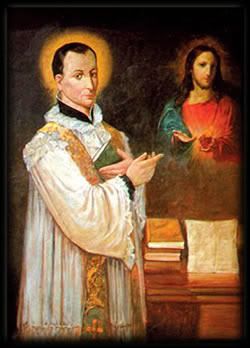 February 15 marks the feast day of Jesuit priest and devotee to the Sacred Heart of Jesus, Saint Claude la Colombière (born 1641, died 1682). Claude was a reluctant saint, born into a middle class family in southeastern France. He excelled at studies, and enjoyed the company of his family and friends, social activities, and the explosion of arts and literature occurring at the time. While he felt called to God, in his early writings, he noted “a terrible aversion for the life embraced.”
February 15 marks the feast day of Jesuit priest and devotee to the Sacred Heart of Jesus, Saint Claude la Colombière (born 1641, died 1682). Claude was a reluctant saint, born into a middle class family in southeastern France. He excelled at studies, and enjoyed the company of his family and friends, social activities, and the explosion of arts and literature occurring at the time. While he felt called to God, in his early writings, he noted “a terrible aversion for the life embraced.” In 1674, Saint Claude, following prayer and meditation, vowed to observe the rules of the Society of Jesus—the Jesuits. He joyfully embraced the vows of the order, eloquently put forth by Saint Ignatius of Loyola: “Whoever desires to serve as a soldier of God beneath the banner of the cross in our Society, which we desire to be designated by the name of Jesus, and to serve the Lord alone and the Church, his spouse, under the Roman pontiff, the vicar of Christ on earth, should, after a solemn vow of perpetual chastity, poverty and obedience, keep what follows in mind. He is a member of a Society founded chiefly for this purpose: to strive especially for the defense and propagation of the faith and for the progress of souls in Christian life and doctrine."
In February 1675, he was re-assigned as the Rector of the College at Paray-le-Monial, a secluded area, far from the reach of crowds where such a proficient homilist might be useful. However, in Paray was a small convent, the Monastery of the Visitation, where a humble sister, Margaret Mary Alacoque, required spiritual direction. Saint Margaret Mary, known for her devotion to the Sacred Heart of Jesus, had been receiving visitations from Our Lord, revealing the treasures of his Heart. She was struggling to make sense of her visions, understand her role, and was worried and anguished about how to proceed. During her visitations, the Lord had promised to send her "My faithful servant and perfect friend" to help her undertake her calling: revealing to the world the unfathomable riches of his love.
Saint Margaret Mary had several visitations from our Lord in the years leading up to Saint Claude’s arrival and role as her confessor and spiritual director. During these meetings with Christ, He encouraged her to lay her head on His chest, listening to His Sacred Heart, and revealing the mysteries of His unfathomable love. Per Margaret Mary’s reports to Father Claude, Jesus further requested honor under the figure of His Sacred Heart, reception of frequent Eucharist, and prayer before the Blessed Sacrament as reparation of sins. Finally, during what has come to be known as the “great apparition,” Jesus said to Saint Margaret Mary, "Behold the Heart that has so loved men ... instead of gratitude I receive from the greater part of mankind only ingratitude..." Jesus urged a feast day of reparation, as well as continued prayer and Eucharist.
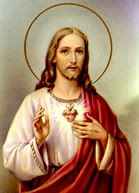 Upon meeting her, Saint Claude immediately recognized her humble sanctity, and acknowledged the truth of her claims. She told him of her communications with the Lord, which he encouraged her to write down in detail. Convinced through prayer and meditation that it was the will of God for others to hear of these communications, he later compiled these visions into a book, and devoted himself to spreading the message of God’s love.
Upon meeting her, Saint Claude immediately recognized her humble sanctity, and acknowledged the truth of her claims. She told him of her communications with the Lord, which he encouraged her to write down in detail. Convinced through prayer and meditation that it was the will of God for others to hear of these communications, he later compiled these visions into a book, and devoted himself to spreading the message of God’s love.After 18 months In Paray, Saint Claude was re-assigned to London, England, having been appointed as confessor to the Duchess of York. He took up residence in the Palace of Saint James, continuing to deliver powerful sermons and spread the devotion to the Sacred Heart. The English weather did not agree with him, and he was frequently ill, a pulmonary disease causing significant pain. However, he embraced his suffering, continuing to preach and brought many back to the Church.
Saint Claude continued his good work in England until 1678 when he, along with many priests and religious, were accused of involvment in a “Papist Plot” to assasinate and wrest power from King Charles II. Saint Claude was thrown into prison, where he languished in horrible conditions, until the intervention of the Duchess of York and King Louis XIV. He was released and returned to France, but his imprisonment had taken a serious toll on his health. He rapidly deteriorated, and died on the first Sunday of Lent in 1682. He is considered a “dry martyr,” having long-suffered for the Lord.
When the news reached the Visitation monastery on the following morning, Saint Margaret Mary immediately urged her community: “Pray for him and get everyone else to pray for him.” However, at sometime around eleven that morning, she stopped praying, smiling, and declared: “Stop worrying about him. Invoke him; have no fear, he is more powerful than ever to help you.” The prioress of the order, Mother M. Greyfie, gently inquired as to why she had felt the urge to stop praying. Generally, Margaret Mary would ask for prayers or mortifications when someone died. Saint Margaret Mary replied with an expression of great joy: “Father La Colombière has no further need of them. He is now in a position to pray for us, so well placed is he in heaven by the goodness and mercy of the Sacred Heart of Our Lord.”
Devotion of the Sacred Heart of Jesus only grew. Saint Margaret Mary continued to seek the intercession of Saint Claude for the next eight years, until she died, praying, “O Blessed Father Claude la Colombiere, I take you for my intercessor before the Sacred Heart of Jesus Christ. Obtain for me from his goodness the grace not to resist the designs he has on my soul, and to make me a more perfect imitator of the virtues of his divine heart.”
Saint Claude la Colombière is recognized for his important decisions, decisions that may be helpful to contemplate as we look forward through the Liturgical year toward the Lenten season: 1) to sacrifice his earthly desires to serve the Lord; 2) to honor his call to the vows of the Jesuits; 3) to recognize the truth in the Sacred Heart of Jesus, and propagate the devotion; 4) to go where the Lord would have him, suffering without complaint; and 5) to continue unafraid and undeterred in preaching the Good News. Saint Claude la Colombière never lost sight of the Lord, never gave up hope, never let his confidence be shaken. How often can we say the same of ourselves?
Lord, I am in this world to show Your mercy to others.
Other people will glorify You
by making visible the power of Your grace
by their fidelity and constancy to You.
For my part I will glorify You
by making known how good You are to sinners,
that Your mercy is boundless
and that no sinner no matter how great his offences
should have reason to despair of pardon.
If I have grievously offended You, My Redeemer,
let me not offend You even more
by thinking that You are not kind enough to pardon Me.
Amen.
Year 2: Day 46 of 365
Prayer Intentions: Confidence and Hope in the Lord
Requested Intentions: Employment for a son (C); Successful attainment of an important appointed position (J); Recovery from cancer for a friend (Z); For a family’s freedom from sin (M); For a daughter with Diabetes (A); Reconciliation of a marriage (D); Assistance with a legal matter, financial freedom (R); Healing for a friend (M); For a son in medical school (H); Financial assistance (M); Successful employment (N): Freedom from mental illness for a friend (L); For successful marriage (N); For friends having and recovering from surgery; for the reduction of a brain tumor (L); For resolution of a housing crisis (P); For a brother who is struggling financially, for a son who is struggling academically (B); For financial security for a friend (C); Success in business; familial happiness and health (J); Health and recovery of a sister (I); Healing of a father following stroke (S).
Blessed Miguel Augustin Pro: Prayers to the Virgin of Sorrows and the Heart of Jesus
Posted by Jacob
Today, November 23, we celebrate the feast day of Blessed Miguel Augustin Pro (1891-1927), modern-day martyr of Mexico. Father Pro was executed by firing squad on November 23, 1927, for defending the faith and serving his community at a time when Catholicism was forbidden in Mexico. Devoted to the Lord until his final breath, Father Pro’s last words were “Viva Cristo Rey!” (Long live Christ the King!). Devoted to suffering and the Heart of Jesus, Father Pro penned these prayers.
Prayer to the Blessed Virgin of Sorrows
Let me live my life at your side, my Mother, and be the companion of your bitter
solitude and your profound pain. Let my soul feel your eyes’ sad weeping and the
abandonment of your heart.
On the road of my life I do not wish to savor the happiness of Bethlehem, adoring
the Child Jesus in your virginal arms. I do not wish to enjoy the amiable presence
of Jesus Christ in the humble little house of Nazareth. I do not care to accompany
you on your glorious Assumption to the angels’ choir.
For my life, I covet the jeers and mockery of Calvary; the slow agony of your Son,
the contempt, the ignominy, the infamy of His Cross. I wish to stand at your side,
most sorrowful Virgin, strengthening my spirit with your tears, consummating my
sacrifice with your martyrdom, sustaining my heart with your solitude, loving my
God and your God with the immolation of my being.
Prayer to the Heart of Jesus
Let me live my life at your side, my Mother, and be the companion of your bitter
solitude and your profound pain. Let my soul feel your eyes’ sad weeping and the
abandonment of your heart.
On the road of my life I do not wish to savor the happiness of Bethlehem, adoring
the Child Jesus in your virginal arms. I do not wish to enjoy the amiable presence
of Jesus Christ in the humble little house of Nazareth. I do not care to accompany
you on your glorious Assumption to the angels’ choir.
For my life, I covet the jeers and mockery of Calvary; the slow agony of your Son,
the contempt, the ignominy, the infamy of His Cross. I wish to stand at your side,
most sorrowful Virgin, strengthening my spirit with your tears, consummating my
sacrifice with your martyrdom, sustaining my heart with your solitude, loving my
God and your God with the immolation of my being.
Prayer to the Blessed Virgin of Sorrows
Let me live my life at your side, my Mother, and be the companion of your bitter
solitude and your profound pain. Let my soul feel your eyes’ sad weeping and the
abandonment of your heart.
On the road of my life I do not wish to savor the happiness of Bethlehem, adoring
the Child Jesus in your virginal arms. I do not wish to enjoy the amiable presence
of Jesus Christ in the humble little house of Nazareth. I do not care to accompany
you on your glorious Assumption to the angels’ choir.
For my life, I covet the jeers and mockery of Calvary; the slow agony of your Son,
the contempt, the ignominy, the infamy of His Cross. I wish to stand at your side,
most sorrowful Virgin, strengthening my spirit with your tears, consummating my
sacrifice with your martyrdom, sustaining my heart with your solitude, loving my
God and your God with the immolation of my being.
Prayer to the Heart of Jesus
Let me live my life at your side, my Mother, and be the companion of your bitter
solitude and your profound pain. Let my soul feel your eyes’ sad weeping and the
abandonment of your heart.
On the road of my life I do not wish to savor the happiness of Bethlehem, adoring
the Child Jesus in your virginal arms. I do not wish to enjoy the amiable presence
of Jesus Christ in the humble little house of Nazareth. I do not care to accompany
you on your glorious Assumption to the angels’ choir.
For my life, I covet the jeers and mockery of Calvary; the slow agony of your Son,
the contempt, the ignominy, the infamy of His Cross. I wish to stand at your side,
most sorrowful Virgin, strengthening my spirit with your tears, consummating my
sacrifice with your martyrdom, sustaining my heart with your solitude, loving my
God and your God with the immolation of my being.
"Lord, you have granted me your secret friendship by opening the sacred ark of your divinity, your deified heart, to me in so many ways as to be the source of all my happiness; sometimes imparting it freely, sometimes as a special mark of our mutual friendship. You have so often melted my soul with your loving caresses that, if I did not know the abyss of your overflowing condescensions, I should be amazed were I told that even your Blessed Mother had been chosen to receive such extraordinary marks of tenderness and affection"
Today, November 16, we also celebrate the feast day of Saint Gertrude the Great (also known as Gertrude of Helfta, 1256-1302), mystic, writer, visionary, Virgin of the Church, and Abbess. Saint Gertrude is referred to as "the Great" because of her single-hearted love for the Sacred Heart of Jesus, her numerous writings and exercises for the faithful, and her tireless compassion and prayer for the souls in purgatory.
Little is known about the early life of Gertrude, other than that she was born in Eisleben in Saxony. Her parents were either deceased or incapacitated, and by the age of five, Gertrude had been placed in the care of a cloister of Benedictine nuns in Rodalsdorf. When she completed her studies, she was moved to the monastery at Helfta (although it isn’t clear why). The sisters of the Helfta monastery kept records, describing the child, Gertrude, as loveable, quick-witted, and gracious. She progressed through her studies with ease, demonstrating clarity of thought and depth of understanding far beyond her years. While she excelled at all subjects—including grammar, rhetoric, logic, and Latin—Gertrude was most adept at theology and divinity studies. She also studied and excelled at music.
When she reached the age of admission, sometime around 16, Gertrude took the veil at Helfta monastery, entering the community there, and committing herself completely in service to the Lord. As a novice, she continued her studies in liturgy, scripture, and spiritual writing. A voracious reader, she became fluent in Latin and German. However, as much as she excelled at her studies, her sisters believed her to be neglecting her spiritual calling. And by her own admission, by the age of 24, Gertrude had grown tired of the monastic routine, and fallen into a deep depression.
However, that would soon change. Just after she reached her 25th year, Gertrude was confronted by a mystical encounter with Christ—an event she referred to as her “conversion.” In her experience, she heard Christ (deep within her heart) say: "Do not fear. I will save you and set you free." She wrote: "in a happy hour, at the beginning of twilight, thou O God of truth, more radiant than any light, yet deeper than any secret thing, determined to dissolve the obscurity of my darkness." What followed was a series of mystical visions and ecstasies, which drew her into contemplative, mystical prayer, transformed her life, increased her devotion to the Sacred Heart of Jesus, and led her to pen her exercises. Gertrude gave up her literary studies completely, spending all of her time in prayer, study of Scripture, and contemplation.
Saint Gertrude prayed that she, and her sisters, might have more time to pray and fewer distractions and requirements. During one encounter, Jesus answered "It does not matter to me whether you perform spiritual exercises or manual labor, provided only that your will is directed to me with a right intention. If I took pleasure only in your spiritual exercises, I should certainly have reformed human nature after Adam's fall so that it would not need food, clothing or the other things that man must find or make with such effort."
Saint Gertrude was especially devoted to the Sacred Heart of Jesus, as well to the suffering of the souls in Purgatory. In one Vision, Our Lord told Gertrude that He longs for someone to ask Him to release souls from purgatory, just as a king who imprisons a friend for justice's sake hopes that someone will beg for mercy for his friend. In her text, Gertrude recorded the Lord’s words: "I accept with highest pleasure what is offered to Me for the poor souls, for I long inexpressibly to have near Me those for whom I paid so great a price. By the prayers of thy loving soul, I am induced to free a prisoner from purgatory as often as thou dost move thy tongue to utter a word of prayer."
At another time, Gertrude was given the following Prayer, which Our Lord told her would release 1000 Souls from Purgatory every time it is said with love and devotion. "Eternal Father, I offer You the Most Precious Blood of Thy Divine Son, Jesus Christ, in union with the Masses said throughout the world today, for all the Holy Souls in Purgatory, for sinners everywhere, those in the Universal Church, in my home, and in my family." From that moment, Gertrude prayed incessantly for the souls of Purgatory.
Gertrude’s mystical encounters with the Lord continued, and when she turned 33, Jesus asked her to record in writing an account of her experiences. Out of humility, she resisted, but eventually acquiesced so that her experiences might encourage others. Gertrude penned a short biography, entitled “The Herald of God’s Loving-Kindness,” to which her sisters added all the information they knew about her. In her text, Gertrude carefully described her own “conversion” and awakening to Christ, and her complete unconditional surrender to the grace and beauty of the Lord.
Gertrude later wrote another text, her “Spiritual Exercises,” to inspire and encourage her sisters with prayers, hymns, and reflections. Saint Gertrude’s exercises remain important, grounded in themes and rites of Church liturgy for occasions of Baptism, conversion, commitment, discipleship, union with God, praise of God, and preparation for death. They continue to be practiced by those who are interested in deepening their spirituality through prayer and meditation.
Saint Gertrude’s visions continued until the end of her life. When it was her time, the Lord called her to Him, saying: "Come, my chosen one, and I will place in you My throne." Her relics remain at the Abbey in Helfta, where they are venerated today. Though she was never formally canonized, Pope Clement XII in 1677 directed that her feast be observed throughout the Church.
Saint Gertrude's understanding of God's love continues to inspire us today. For her, the love of the Lord is anchored in the mystery of the mutual love between the Persons of the Blessed Trinity, which is forever directed toward all creation. But for Gertrude, the focus on the mystery of Jesus was less about history and more about the humanity He shares with us. Her emphasis was not that we should imitate Jesus, but that we are invited to participate in a human-divine union that already exists, based upon His creation. In prayer and sacrament, we encounter this blessed union. Gertrude lived this love every day, throughout her activities and the Liturgy, where she found Christ. Her life is a reminder to each of us that the heart of the Christian life is prayer, through which we unite with Our Lord in a deeply personal way.
From the Revelations by Saint Gertrude:
“May my soul bless you, O Lord God my Creator, may my soul bless you. From the very core of my being may all your merciful gifts sing your praise. Your generous care for your daughter has been rich in mercy; indeed it has been immeasurable, and as far as I am able I give you thanks. I praise and glorify your great patience which bore with me even though, from my infancy and childhood, adolescence and early womanhood, until I was nearly 26, I was always so blindly irresponsible. Looking back I see that but for your protecting hand I would haven been quite without conscience in thought, word or deed. But you came to my aid by giving me a natural dislike of evil and a natural delight in what is good, and provided me with necessary correction from those among whom I lived. To make amends for the way I previously lived, I offer you, most loving Father, all the sufferings of your beloved Son, from that first infant cry as he lay on the hay in the manger, until that final movement when, bowing his head, with a mighty voice, Christ gave up his spirit. I think, as I make this offering, of all that he underwent, his needs as a baby, his dependence as a young child, the hardships of youth and the trials of early manhood. To atone for all my neglect I offer, most loving Father, all that your only-begotten Son did during his life, whether in thought, word or deed. And now, as an act of thanksgiving, I praise and worship you, Father, in deepest humility for you most loving kindness and mercy. Though I was hurrying to my eternal loss, your thoughts of me were thoughts of peace and not of affliction, and you lifted me up with so many great favors. Finally, you drew me to yourself by your faithful promises of the good things you would give me from the hour of my death. So great are these promises that for their sake alone, even if you had given me nothing besides, my heart would sigh for you always and be filled with a lively hope.”
The Prayer of Saint Gertrude for the Souls in Purgatory
Eternal Father, I offer Thee the most Precious Blood of Thy Divine Son, Jesus Christ, in union with the Masses said throughout the world today, for all the Holy Souls in Purgatory, for sinners everywhere, for sinners in the Universal Church, for those in my own home and within my family. Amen.
Prayer to the Sacred Heart of Jesus
O Sacred Heart of Jesus, fountain of eternal life, Your Heart is a glowing furnace of Love. You are my refuge and my sanctuary. O my adorable and loving Savior, consume my heart with the burning fire with which Yours is aflamed. Pour down on my soul those graces which flow from Your love. Let my heart be united with Yours. Let my will be conformed to Yours in all things. May Your Will be the rule of all my desires and actions. Amen.
Father,
you filled the heart of St. Gertrude
with the presence of your love.
Bring light into our darkness
and let us experience the joy of your presence
and the power of your grace.
Grant this through our Lord Jesus Christ, your Son, who
lives and reigns with you and the Holy Spirit, one God, for ever and ever. Amen.
Day 320 of 365
Prayer Intentions: Deep Union with the Lord; Improved Prayer Lives
Requested Intentions: For unity between estranged friends (E); For a son, falsely arrested (C); Successful employment (J); Successful employment (L); For a healthy child (L); Recovery from stomach illness of a friend (A); Employment and financial security (E); Conversion of sons (L); Freedom from financial stress, employment (C); Spiritual growth and family peace (A); Freedom to immigrate (D); End to debt (N); Restoration of a marriage (J); Complete recovery of son (P); Recovery of parish priest, health of mother, conversion of son (J); Successful employment, end to depression (J); Successful immigration and employment (S); Conversion of an unloving daughter (M); Recovery of husband, health of mother, economic freedom (R); Freedom from depression, restoration of family relationships (N); Restoration of a relationship (J); Healing of friends from cancer (J); Complete healing of a friend with pancreatic cancer (J); Healing of a father following stroke (S).
Today, November 16, we also celebrate the feast day of Saint Gertrude the Great (also known as Gertrude of Helfta, 1256-1302), mystic, writer, visionary, Virgin of the Church, and Abbess. Saint Gertrude is referred to as "the Great" because of her single-hearted love for the Sacred Heart of Jesus, her numerous writings and exercises for the faithful, and her tireless compassion and prayer for the souls in purgatory.
Little is known about the early life of Gertrude, other than that she was born in Eisleben in Saxony. Her parents were either deceased or incapacitated, and by the age of five, Gertrude had been placed in the care of a cloister of Benedictine nuns in Rodalsdorf. When she completed her studies, she was moved to the monastery at Helfta (although it isn’t clear why). The sisters of the Helfta monastery kept records, describing the child, Gertrude, as loveable, quick-witted, and gracious. She progressed through her studies with ease, demonstrating clarity of thought and depth of understanding far beyond her years. While she excelled at all subjects—including grammar, rhetoric, logic, and Latin—Gertrude was most adept at theology and divinity studies. She also studied and excelled at music.
When she reached the age of admission, sometime around 16, Gertrude took the veil at Helfta monastery, entering the community there, and committing herself completely in service to the Lord. As a novice, she continued her studies in liturgy, scripture, and spiritual writing. A voracious reader, she became fluent in Latin and German. However, as much as she excelled at her studies, her sisters believed her to be neglecting her spiritual calling. And by her own admission, by the age of 24, Gertrude had grown tired of the monastic routine, and fallen into a deep depression.
However, that would soon change. Just after she reached her 25th year, Gertrude was confronted by a mystical encounter with Christ—an event she referred to as her “conversion.” In her experience, she heard Christ (deep within her heart) say: "Do not fear. I will save you and set you free." She wrote: "in a happy hour, at the beginning of twilight, thou O God of truth, more radiant than any light, yet deeper than any secret thing, determined to dissolve the obscurity of my darkness." What followed was a series of mystical visions and ecstasies, which drew her into contemplative, mystical prayer, transformed her life, increased her devotion to the Sacred Heart of Jesus, and led her to pen her exercises. Gertrude gave up her literary studies completely, spending all of her time in prayer, study of Scripture, and contemplation.
Saint Gertrude prayed that she, and her sisters, might have more time to pray and fewer distractions and requirements. During one encounter, Jesus answered "It does not matter to me whether you perform spiritual exercises or manual labor, provided only that your will is directed to me with a right intention. If I took pleasure only in your spiritual exercises, I should certainly have reformed human nature after Adam's fall so that it would not need food, clothing or the other things that man must find or make with such effort."
Saint Gertrude was especially devoted to the Sacred Heart of Jesus, as well to the suffering of the souls in Purgatory. In one Vision, Our Lord told Gertrude that He longs for someone to ask Him to release souls from purgatory, just as a king who imprisons a friend for justice's sake hopes that someone will beg for mercy for his friend. In her text, Gertrude recorded the Lord’s words: "I accept with highest pleasure what is offered to Me for the poor souls, for I long inexpressibly to have near Me those for whom I paid so great a price. By the prayers of thy loving soul, I am induced to free a prisoner from purgatory as often as thou dost move thy tongue to utter a word of prayer."
At another time, Gertrude was given the following Prayer, which Our Lord told her would release 1000 Souls from Purgatory every time it is said with love and devotion. "Eternal Father, I offer You the Most Precious Blood of Thy Divine Son, Jesus Christ, in union with the Masses said throughout the world today, for all the Holy Souls in Purgatory, for sinners everywhere, those in the Universal Church, in my home, and in my family." From that moment, Gertrude prayed incessantly for the souls of Purgatory.
Gertrude’s mystical encounters with the Lord continued, and when she turned 33, Jesus asked her to record in writing an account of her experiences. Out of humility, she resisted, but eventually acquiesced so that her experiences might encourage others. Gertrude penned a short biography, entitled “The Herald of God’s Loving-Kindness,” to which her sisters added all the information they knew about her. In her text, Gertrude carefully described her own “conversion” and awakening to Christ, and her complete unconditional surrender to the grace and beauty of the Lord.
Gertrude later wrote another text, her “Spiritual Exercises,” to inspire and encourage her sisters with prayers, hymns, and reflections. Saint Gertrude’s exercises remain important, grounded in themes and rites of Church liturgy for occasions of Baptism, conversion, commitment, discipleship, union with God, praise of God, and preparation for death. They continue to be practiced by those who are interested in deepening their spirituality through prayer and meditation.
Saint Gertrude’s visions continued until the end of her life. When it was her time, the Lord called her to Him, saying: "Come, my chosen one, and I will place in you My throne." Her relics remain at the Abbey in Helfta, where they are venerated today. Though she was never formally canonized, Pope Clement XII in 1677 directed that her feast be observed throughout the Church.
Saint Gertrude's understanding of God's love continues to inspire us today. For her, the love of the Lord is anchored in the mystery of the mutual love between the Persons of the Blessed Trinity, which is forever directed toward all creation. But for Gertrude, the focus on the mystery of Jesus was less about history and more about the humanity He shares with us. Her emphasis was not that we should imitate Jesus, but that we are invited to participate in a human-divine union that already exists, based upon His creation. In prayer and sacrament, we encounter this blessed union. Gertrude lived this love every day, throughout her activities and the Liturgy, where she found Christ. Her life is a reminder to each of us that the heart of the Christian life is prayer, through which we unite with Our Lord in a deeply personal way.
From the Revelations by Saint Gertrude:
“May my soul bless you, O Lord God my Creator, may my soul bless you. From the very core of my being may all your merciful gifts sing your praise. Your generous care for your daughter has been rich in mercy; indeed it has been immeasurable, and as far as I am able I give you thanks. I praise and glorify your great patience which bore with me even though, from my infancy and childhood, adolescence and early womanhood, until I was nearly 26, I was always so blindly irresponsible. Looking back I see that but for your protecting hand I would haven been quite without conscience in thought, word or deed. But you came to my aid by giving me a natural dislike of evil and a natural delight in what is good, and provided me with necessary correction from those among whom I lived. To make amends for the way I previously lived, I offer you, most loving Father, all the sufferings of your beloved Son, from that first infant cry as he lay on the hay in the manger, until that final movement when, bowing his head, with a mighty voice, Christ gave up his spirit. I think, as I make this offering, of all that he underwent, his needs as a baby, his dependence as a young child, the hardships of youth and the trials of early manhood. To atone for all my neglect I offer, most loving Father, all that your only-begotten Son did during his life, whether in thought, word or deed. And now, as an act of thanksgiving, I praise and worship you, Father, in deepest humility for you most loving kindness and mercy. Though I was hurrying to my eternal loss, your thoughts of me were thoughts of peace and not of affliction, and you lifted me up with so many great favors. Finally, you drew me to yourself by your faithful promises of the good things you would give me from the hour of my death. So great are these promises that for their sake alone, even if you had given me nothing besides, my heart would sigh for you always and be filled with a lively hope.”
The Prayer of Saint Gertrude for the Souls in Purgatory
Eternal Father, I offer Thee the most Precious Blood of Thy Divine Son, Jesus Christ, in union with the Masses said throughout the world today, for all the Holy Souls in Purgatory, for sinners everywhere, for sinners in the Universal Church, for those in my own home and within my family. Amen.
Prayer to the Sacred Heart of Jesus
O Sacred Heart of Jesus, fountain of eternal life, Your Heart is a glowing furnace of Love. You are my refuge and my sanctuary. O my adorable and loving Savior, consume my heart with the burning fire with which Yours is aflamed. Pour down on my soul those graces which flow from Your love. Let my heart be united with Yours. Let my will be conformed to Yours in all things. May Your Will be the rule of all my desires and actions. Amen.
Father,
you filled the heart of St. Gertrude
with the presence of your love.
Bring light into our darkness
and let us experience the joy of your presence
and the power of your grace.
Grant this through our Lord Jesus Christ, your Son, who
lives and reigns with you and the Holy Spirit, one God, for ever and ever. Amen.
Day 320 of 365
Prayer Intentions: Deep Union with the Lord; Improved Prayer Lives
Requested Intentions: For unity between estranged friends (E); For a son, falsely arrested (C); Successful employment (J); Successful employment (L); For a healthy child (L); Recovery from stomach illness of a friend (A); Employment and financial security (E); Conversion of sons (L); Freedom from financial stress, employment (C); Spiritual growth and family peace (A); Freedom to immigrate (D); End to debt (N); Restoration of a marriage (J); Complete recovery of son (P); Recovery of parish priest, health of mother, conversion of son (J); Successful employment, end to depression (J); Successful immigration and employment (S); Conversion of an unloving daughter (M); Recovery of husband, health of mother, economic freedom (R); Freedom from depression, restoration of family relationships (N); Restoration of a relationship (J); Healing of friends from cancer (J); Complete healing of a friend with pancreatic cancer (J); Healing of a father following stroke (S).
comments (0)
|
Labels:
Conversion,
Feast Day,
Holy Name of Jesus,
Sacred Heart of Jesus,
Saints,
Visions
Subscribe to:
Posts (Atom)










